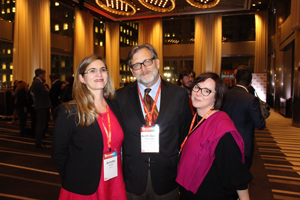
One hundred years ago, the Institute for International Education was founded with the intent to make political, economic, and cultural connections between student, scholars and institutions internationally. Since then, IIE has managed and implemented some of the most iconic higher education programs and initiatives, including the Fulbright Program.
Melanie Gottlieb and Annetta Stroud represented AACRAO at the recent IIE Summit in New York City (February 17-19, 2019). Though many areas and topics were discussed at the Summit, one ever-present theme throughout the Summit was in response to the call for action for access to higher education for refugees and vulnerable populations. From multiple sessions that spoke directly to the role of higher education institutions and their leadership role in supporting access to higher education as a basic human right, to the challenges that immigrants and refugees have integrating into the local workforce. For these vulnerable populations, the lack of recognition of education and professional qualifications is not only detrimental to these individuals, but to our society at large. Higher education institutions not only have a role to play, but also have an obligation to the local communities, and to the constituent’s.
In acknowledgement by IIE of individuals who are leaders in supporting the basic human right to education, Dr. Keith David Watenpaugh, professor and director of Human Rights Studies, University of California Davis was awarded the IIE Centennial Medal on February 19th.
AACRAO congratulates Dr. Watenpaugh on this achievement, and is proud to collaborate with on initiatives that support access to higher education, including the Article 26 Backpack. Watenpaugh is also delivering the International Luncheon session at the 2019 AACRAO Annual Meeting.
The closing plenary speaker, the Right Honourable Gordon Brown, who received the Henry Kaufman Prize, pressed this home with a call to action by higher education professionals to take a larger look at how their institutions can support this basic human right to higher education. Through innovative uses of technology, grass-roots movements, and implementing curricula that speaks to these populations across multiple disciplines, enriches not only the local communities, but also strives to change the rhetoric that the United States and other nations are currently engaging in.